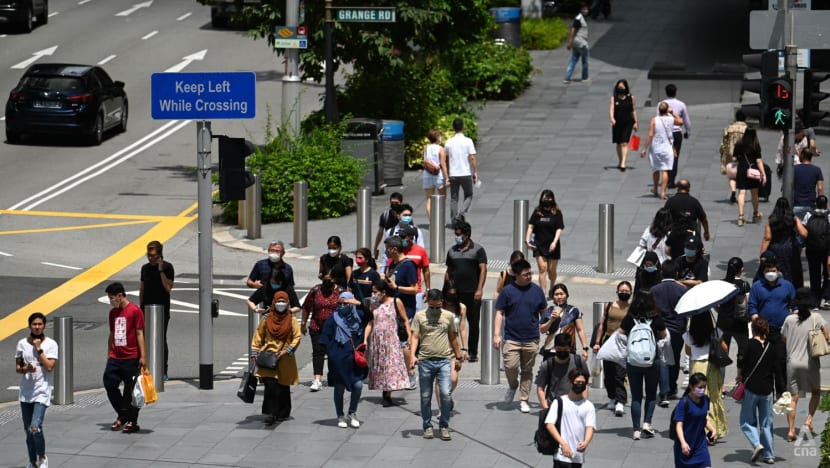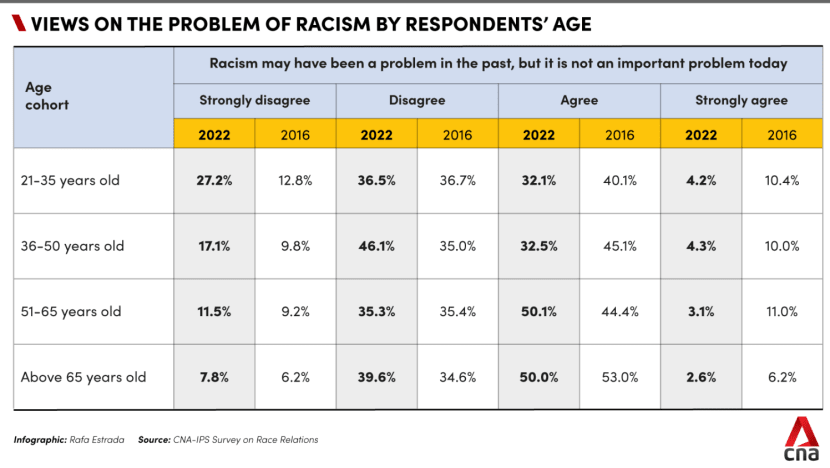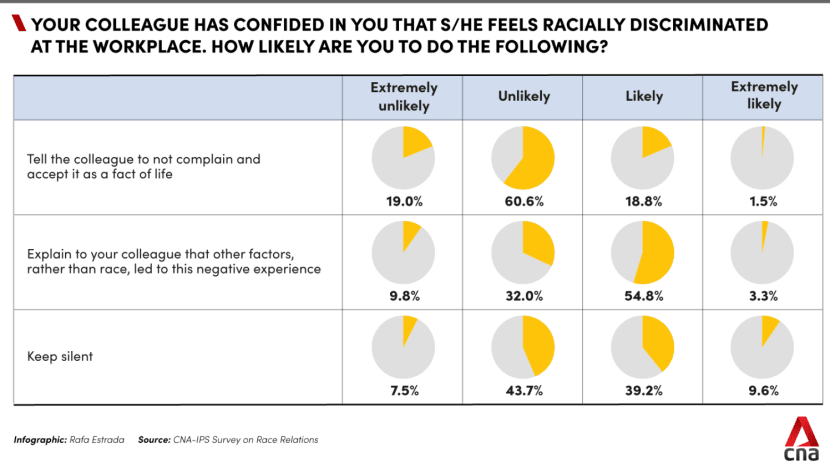Growing number of people in Singapore feel racism is an important problem: CNA-IPS study
The survey also found that a large majority of people believe everyone in Singapore can become rich or successful regardless of their race.

People are seen walking along Orchard Road in Singapore on Mar 29, 2022. (File photo: CNA/Marcus Mark Ramos)
SINGAPORE: A growing number of people think that racism remains an important problem even while the overwhelming majority believe everyone in Singapore can become rich or successful regardless of their race, according to a survey on race relations conducted by CNA and the Institute of Policy Studies (IPS).
More than half of the survey’s respondents (56.2 per cent) felt that racism is an important problem, which was an increase from the previous CNA-IPS survey conducted in 2016 (46.3 per cent).
Despite this, a large majority of people believe that meritocracy is not contingent on race, with more than 80 per cent of respondents agreeing that everyone can become rich or successful irrespective of what race they are, which was consistent with the findings from the 2016 survey.
Conducted last year, the second CNA-IPS survey on race relations polled more than 2,000 Singapore residents aged 21 and above. Their racial composition and the type of homes they live in are reflective of the Singapore population, but an additional 350 or so Malay and Indian respondents were polled so that their views were properly represented.
In the 255-page report, researchers noted that those who feel racism is an important problem tended to be below the age of 50 and had education beyond the secondary level.

While most respondents (88.8 per cent) said it is important for political leaders to talk openly about racism, more than half (58.6 per cent) also felt that such public discourse could cause unnecessary tension.
They may feel that political leaders taking the lead in such discussions could avert some of the potential tension, said the report.
It noted that Chinese respondents (54.9 per cent) were slightly more likely to feel that ethnic minorities are getting overly sensitive in discussions on race, compared to Indian (42.7 per cent) and Malay respondents (47.8 per cent).
The survey also found that respondents were evenly divided on whether there is majority privilege in Singapore, with 53.9 per cent feeling that being of the majority race is an advantage. This was comparable with findings from the 2016 survey, where 52.7 per cent felt this way.
Those between the age of 12 and 35, especially Malay and Indian respondents, were generally more likely to feel that majority privilege exists.
In terms of which cultures respondents felt were more privileged, most (70.2 per cent) said they did not believe that the majority race’s culture was privileged. However, ethnic minorities were more likely to feel that the converse is true.
They were also more likely, compared to Chinese respondents, to perceive that Chinese people can go about their lives without much knowledge of minority cultures.
About three-quarters of all respondents said they did not believe that any race has been getting too demanding in its push for cultural rights, and think that all races’ needs should be given equal priority.
“Accommodating different cultural needs is also seen as compatible with a strong Singaporean identity, with 71.6 per cent feeling that doing so has not impinged on national identity. Virtually all respondents, 92 per cent, expect the level of national unity to increase or at least stay the same in the next five years,” the report said.
EXPERIENCES OF RACISM
One scenario given to respondents was what they would do if a colleague felt like they had been racially discriminated against in their workplace. The survey found that most respondents were unsure what to do, with a large majority selecting “no response” to the question.
Instead, more than half (58.1 per cent) said they were likely to justify the experience as the result of other factors besides the colleague’s race.

The survey also found that “only a small proportion” of respondents faced racial discrimination at work (less than 9 per cent) and in the housing market (3 per cent), with ethnic minorities more affected than Chinese.
In response to such unfair or discriminatory treatment, respondents often felt sad, resigned or angry, according to the survey.
More than 40 per cent said they were not affected by race-related incidents highlighted in the news, with researchers noting a “moderate level of apathy” towards these incidents, especially among older respondents.
While the report did not highlight specific examples of such incidents, among those which have hit the headlines in the recent past are the former Ngee Ann Polytechnic lecturer caught on video making racist remarks to an interracial couple and a viral video which captured a woman repeatedly hitting a gong during a neighbour’s prayer ritual.
For those affected, they tended to be more cautious when talking to someone of a different race, and pay more attention to such stories in the news.
Respondents - especially minorities and younger respondents - generally approved of making police reports after encountering racism, while older respondents tended to be more ambivalent about this issue.
Despite this, the survey found that respondents were unlikely to call out racism via any means, regardless of their race, and especially disapproved of doxxing.
“Vigilante justice online seemed to be a line most respondents would not cross,” the report said.
Fewer than half agreed that people should directly criticise people who have made a racist comment or carried out a racist act, or write a post calling out racist incidents they have observed or personally experienced.
The top reasons for not speaking up about racism include being uncertain of the context behind the behaviour they witnessed, or feeling that it was a matter between the parties involved.
Meanwhile, most said it would benefit minorities if members of the majority race learned about their cultural celebrations, and empathise with those who have experienced discrimination.
However, a slight majority of respondents (57.6 per cent) - particularly older respondents - said they were tired of talking about issues of race and racism while those who were looking forward to more public dialogue, were more likely to be more highly educated respondents as well as minorities.
FUTURE DEVELOPMENT
While many were indifferent about potential future developments to do with race in Singapore, having a greater intercultural understanding ranked highly among respondents, with 62.9 per cent saying that this would be “good” or “very good”.
“This may involve, or be bolstered by, people more commonly learning the language of another ethnic group,” the report said. A substantial proportion, 59.3 per cent, thought this would be beneficial.
“Similarly, on the possibility that people have free choice of which mother tongue(s) to learn, 63.1 per cent indicated that it would be good or very good.”
However, there were mixed sentiments about reducing sensitivity surrounding racial discourse. About half thought this would be “good” or “very good”, while the majority of those remaining felt that it would make no difference.
Indian respondents were more positive about having a national consensus on what constitutes racism, and about having more open discourse about race generally.
Many respondents supported recognising a greater variety of racial and cultural backgrounds, but were not comfortable with removing the Government’s CMIO (Chinese, Malay, Indian and Others) categorisation from identity documents.
While many felt that it would be beneficial for people to identify as “Singaporean” rather than “Singaporean-Chinese”, “Singaporean-Malay”, “Singaporean-Indian” or “Others”, they were less comfortable with policies also moving in a “race-blind” direction.
This refers to racial quotas in housing, immigration law, parliamentary representation and national celebrations.
More than a third of all respondents (34 per cent) felt that Singapore is already “regardless of race, language or religion” but 20 per cent felt that this would never be achieved.
Others believed some time would be needed to achieve this, which could range anywhere from under 10 years to more than 50. These findings were generally consistent across respondents of different races, said the report.
















